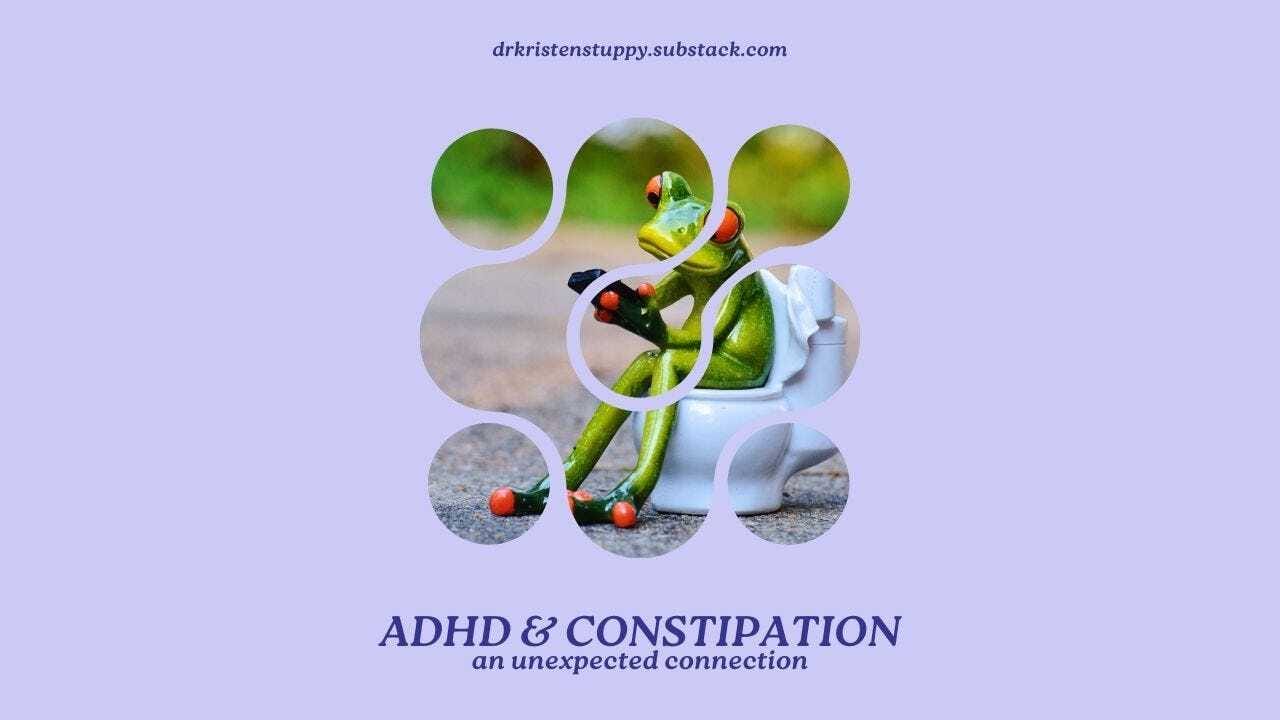
Managing ADHD well can bring a wealth of benefits: improved self-esteem, higher grades, better job prospects, and even less constipation.
Wait, what? Constipation?
Yes, it’s true!
People with ADHD — especially kids — are more likely to struggle with constipation than those without it. Why? Let’s dive in (but not too deep, of course).
ADHD doesn’t cause constipation directly, but many ADHD-related behaviors can affect gut health.
Think about these common scenarios:
🚽 Trouble Finishing Tasks
Kids with ADHD are champs at starting things but not always great at finishing them. This includes bathroom trips.
They might begin to poop, feel some relief, and then hop off the toilet without completing the job.
Leftover stool hangs out in the colon, where it starts a not-so-fun game of "back up."
I often think of this like a bucket of water. If you add a cup of water to the bucket every day but only take out a half a cup, soon you will have an overflowing bucket.
🌪️ Hyperfocus Hijinks
Ever been so absorbed in a task that you forgot to eat or drink? That’s hyperfocus in action, and people with ADHD know it well.
This intense concentration can also make them miss their body’s "time to poop" signals. The longer stool sits in the gut, the drier and harder it gets, which is... exactly as unpleasant as it sounds. It gets harder, which is more uncomfortable to push out, which also leads to fear of going the next time.
🎢 Sensory Sensitivities
Many people with ADHD also have sensory processing differences, which can lead to picky eating.
Crunchy veggies? Nope.
Weird textures? Double nope.
This limits their food variety, often cutting out high-fiber options that keep things moving smoothly through the gut.
🍟 Impulsive Eating
Impulsivity often guides food choices, and let’s face it — comfort foods like chips, cookies, and fast food aren’t known for gut health.
Without a balanced diet, including fiber, fruits, veggies, and whole grains, the digestive system can get sluggish.
🌀 Anxiety's Gut Punch
ADHD and anxiety often travel together, and anxiety and the gut are like frenemies — they’re always affecting each other, often in unpleasant ways.
For someone with ADHD, anxiety can amplify the risk of constipation.
Fear of Painful Poops. All it takes is one painful bowel movement to spark a cycle of fear. The anxiety about "what if it hurts again?" can lead to holding it in, which only makes the problem worse.
Anxiety. People with anxiety — whether related to a recent painful poop or not—often experience digestive slowdowns. When the body is in fight-or-flight mode, it deprioritizes digestion, leaving stool lingering in the gut longer than it should. Have you ever been unable to poop on vacation? That’s situational stress at work and most of us can identify with it, even if we don’t typically suffer from anxiety. Travel-related stress, new surroundings, and altered eating habits can all throw your gut off balance.
What Can You Do?
Build a routine. Set regular times for meals, snacks, and bathroom breaks. Consistency helps regulate gut health.
Encourage hydration. Drinking enough water is key to keeping stool soft and easy to pass.
Boost fiber intake. Work in fiber-rich foods like fruits, veggies, whole grains, and legumes. Kiwi have been shown to be especially helpful.
Talk to your pediatrician. Your pediatrician should be able to help get the constipation under better control. One of my favorite constipation treatments is Miralax. Since it’s unflavored and can be added to their water, it can get the gut moving before they’re ready to accept dietary changes.
Address sensory challenges. If there’s resistance to dietary adjustments to include more fiber-rich foods, consider working with an occupational therapist who helps kids with sensory issues and feeding problems.
Support ADHD management. If you suspect ADHD but there’s no diagnosis yet, talk to your pediatrician to find out how to get your child assessed. With ADHD, the better its symptoms are managed, the easier it is to stick with healthy routines. If you’re struggling, talk to your prescriber about changing the treatment plan.
So, while managing ADHD might not sound like the first step to smoother digestion, it can be! Better focus, organization, and self-care routines benefit the whole body — gut included.
Who knew poop talk could be so empowering? Pediatricians.
Every pediatrician is well versed in poop talk, so don’t be afraid or embarrassed to bring it up.